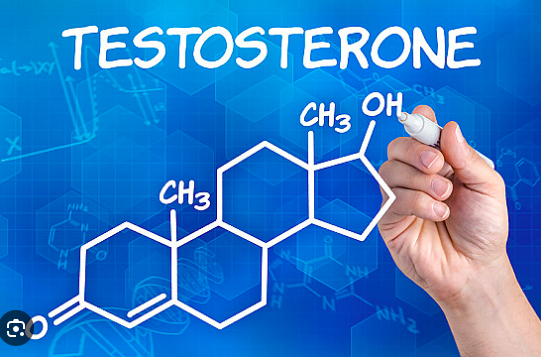
We all know that testosterone is primarily considered a male sex hormone.
BUT… did you know it is also important for your health.
In women, testosterone is produced in smaller quantities by the ovaries and adrenal glands, as well as through conversion of other androgens.
Many in the medical field disregard it’s importance for women’s health, however, it plays several crucial roles including:
1️⃣ Libido and Sexual Function: Testosterone contributes to the libido, or sex drive, in women. Women with low levels of testosterone may experience a decrease in sexual desire.
2️⃣ Bone Health: Testosterone helps to maintain bone density, and low levels may lead to an increased risk of osteoporosis.
3️⃣ Muscle Mass and Strength: Testosterone aids in maintaining muscle mass and strength, which is important for overall physical health.
4️⃣ Mood and Well-being: Testosterone can influence mood and energy levels. Low levels might be associated with fatigue, depression, and a drop in the sense of well-being.
5️⃣ Reproductive Tissue Health: The hormone contributes to the health and function of the ovaries and other reproductive tissues.
6️⃣ Cardiovascular Health: Testosterone has been linked to cardiovascular health (appropriate levels can help with blood vessel dilation and circulation).
💥 In women’s health, maintaining balanced levels of testosterone is critical. However, due to various conditions, such as polycystic ovary syndrome (PCOS), menopause, or adrenal gland disorders, a woman might experience testosterone imbalances.
Hypoandrogenism (a lack of androgens like testosterone)
➡️ Low levels can result in decreased libido, reduced bone and muscle mass, and diminished quality of life. Several factors contribute to lower levels of testosterone in women. Here’s a list of some of the most common factors:
👉 Aging: Testosterone levels naturally decline with age in both men and women.
👉 Ovarian Failure: Premature ovarian failure or the removal of the ovaries can lead to a significant drop in testosterone levels.
👉 Pituitary Dysfunction: The pituitary gland regulates hormone production, and disorders affecting it can cause low testosterone.
👉 Adrenal Insufficiency: Since the adrenal glands produce testosterone precursors, any dysfunction can lead to lowered levels.
👉 Hypothyroidism: An underactive thyroid gland can lead to changes in overall hormone production.
👉 Certain Medications: Birth control pills, glucocorticoids, and other medications can affect testosterone levels.
👉 Extreme Weight Loss or Gain: Excessive changes in body weight and fat distribution can disrupt hormonal balances.
👉 Chronic Illness: Long-term diseases like diabetes can impact testosterone production.
👉 Sedentary Lifestyle: A lack of physical activity can contribute to lower testosterone levels.
👉 Poor Sleep: Regularly getting insufficient sleep has been linked to lower hormone levels, including testosterone.
👉 High Levels of Stress: Prolonged stress increases cortisol production, which inversely affects testosterone.
👉 Alcohol Abuse: Excessive alcohol intake can impair the glands that produce testosterone.
👉 Nutritional Deficiencies: Insufficient intake of certain nutrients, like Vitamin D, zinc, and magnesium, may affect testosterone synthesis.
👉 Use of Opioids or Other Drugs: Opioids and other drugs can negatively impact hormone production.
👉 Environmental Toxins: Chronic exposure to endocrine-disrupting chemicals like bisphenol A (BPA) and phthalates may affect testosterone levels.
Hyperandrogenism (an excess of androgens like testosterone)
➡️ Elevated levels of testosterone can lead to symptoms such as hair loss, irregular or absent menstrual periods, acne, and an increased risk of metabolic syndrome. Here’s a list of factors that can contribute to high levels of testosterone in women:
👉 Polycystic Ovary Syndrome (PCOS): This is one of the most common endocrine disorders in women of reproductive age, characterized by multiple ovarian cysts, irregular menstrual cycles, and high testosterone levels.
👉 Congenital Adrenal Hyperplasia (CAH): A genetic disorder affecting the adrenal glands, CAH can result in excess production of testosterone and other androgens.
👉 Adrenal Gland Disorders: Tumors or hyperfunction of the adrenal glands can lead to excessive testosterone production.
👉 Ovarian Tumors: Though rare, certain ovarian tumors can produce excessive amounts of testosterone.
👉 Medications: Certain drugs for different health conditions can increase testosterone levels as a side effect.
👉 Insulin Resistance: Insulin resistance is associated with PCOS and can increase levels of insulin in the blood, which can in turn stimulate the ovaries to produce more testosterone.
👉 Obesity: Increased adipose tissue can lead to hormonal imbalances.
👉 Hormone Supplementation or Steroid Use: Some women might use hormone supplements or steroids that can unintentionally raise testosterone levels excessively.
👉 Thyroid Disorders: Thyroid dysfunctions may sometimes contribute to hormonal imbalances, including elevated testosterone.
👉 Cushing’s Syndrome: This condition, which is due to high levels of cortisol, might also cause elevated androgen levels.
👉 High Levels of Physical Stress: Intense physical training or stress can contribute to hormonal imbalances.
💥 Improving your testosterone levels
When I am working with my clients to improve their testosterone levels, these are the areas we focus on:
✅ Exercise Regularly: Strength training can help increase testosterone levels.
✅ Maintain a Healthy Diet: Ensure your diet includes whole foods, with a balance of fats, proteins, and carbohydrates. Particularly, foods rich in zinc (like oysters and other shellfish) and vitamin D can support testosterone production.
✅ Manage Stress: Chronic stress raises cortisol levels, which negatively affects testosterone. Methods to reduce stress include meditation, deep breathing exercises, yoga, and other relaxation techniques.
✅ Get Enough Sleep: Lack of sleep can affect hormone production, including testosterone. Aim for 7-9 hours of quality sleep per night.
✅ Avoid Alcohol, Drugs, and Smoking: These substances can reduce testosterone levels, so moderating consumption can help maintain hormone balance.
✅ Consider Supplements: Certain supplements like vitamin D, magnesium, and zinc could help. I consult with my clients about any supplementation that I determine they need based on their labs.
✅ Follow Healthy Weight Management: Both obesity and anorexia can disrupt hormone production. A healthy body weight leads to improved testosterone levels.
It is important for you to have your hormone levels checked at least once a year even if you aren’t experiencing symptoms that may indicate an imbalance.
I work with my clients to uncover hormone imbalances, through lab work or other tests, to get them into the best shape of their lives – internally and externally. Click the link below to schedule a Discovery Call to better understand where you are hormonally.
Now go slay your day!
~Coach Laura
“If you want to go fast go alone. If you want to go far, go with others.” ~African Proverb
Baked Fish Sticks
Servings 4: 5 sticks plus sauce
INGREDIENTS:
For the Caper Sauce:
- 1/4 cup fat free plain Greek yogurt
- 3 tablespoons light mayonnaise
- 1 tablespoon drained capers
- 1 tablespoon fresh minced chives
- 1 teaspoon fresh lemon juice
- 1/4 teaspoon kosher salt
- 1/8 teaspoon balk pepper
For the Fish Sticks:
- olive oil spray
- 1 pound Alaskan skinless cod fillet, about 1-inch thick (thawed if frozen)
- 3 large egg whites, or 2 whole eggs
- 1 tablespoon Dijon mustard
- 1/2 lemon, squeezed
- 1/8 teaspoon paprika
- 1/4 teaspoon kosher salt
- 1/8 teaspoon black pepper
For the crumbs:
- 1 cup plain or gluten-free Panko crumbs
- 1 1/2 teaspoons Old Bay seasoning
- 2 teaspoons dried parsley flakes
- 1/2 teaspoon paprika
INSTRUCTIONS:
OVEN METHOD:
- Combine all the ingredients for the dipping sauce in a small bowl; set aside.
- Preheat the oven to 450°F and adjust the rack to the center position. Spray a large rimmed baking sheet with oil.
- Slice the fish crosswise into 2-inch long strips, about 1-inch wide.
- Combine egg whites, Dijon mustard, lemon juice, paprika, salt and pepper in a medium bowl.
- In a second bowl combine the Panko crumbs with Old Bay seasoning, dried parsley and remaining paprika.
- Pat fish dry with paper towels and dip the fish into the egg mixture, then into crumbs and place on the prepared baking sheet.
- Spray the top of the fish with oil and bake until the crumbs are golden and the fish is cooked through, about 12 minutes, or until the crumbs are golden and the fish is cooked through.
AIR FRYER METHOD:
- Preheat the air fryer to 370F.
- In batches, transfer to the air fryer basket in a single layer and cook until the crumbs are golden and the fish is cooked through, 7 to 8 minutes, turning halfway.






